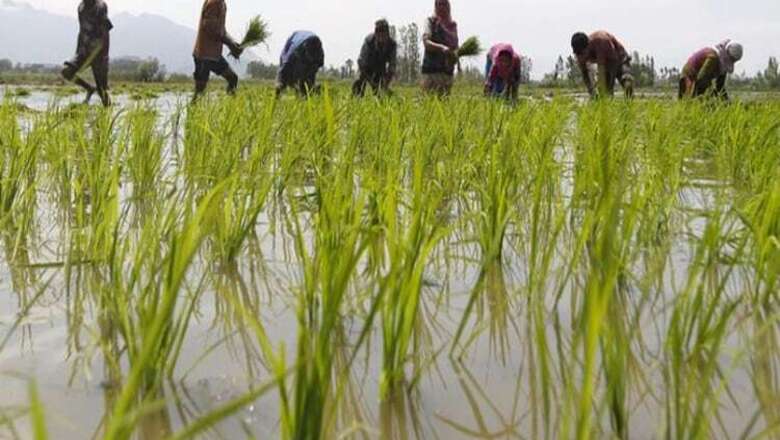
views
Narendra Modi government's ambitious programme 'Make in India' should not be confined only to manufacturing but should extend to agriculture as well. To be able to produce enough for more of us, with less land, water and harmful chemicals, agriculture must combine technology with good agronomic practices. Modern farming is about producing what the consumer wants, which means working backwards from the fork to the field.
Here's a look at how contract farming or collaboration between large corporates and farmers in Burdwan in West Bengal and Palanpur in Gujarat has raised productivity and farm incomes.
Potato chips were traditionally made from the ones used to make vegetables at homes. They comes in various shapes and sizes. Because of their high sugar content, which gets caramelized upon frying, chips are coloured fifty shades of yellow. But the fries at McDonald's an American fast food joint are uniformly golden like its golden arches symbol. Pepsi and ITC's wafers are also similarly smartly dressed, no dirty brown for them as consumers want food to look pretty and not just be tasty. Companies strive to indulge them.
Vivek Bharati: Executive Director, Agriculture and Corp Affairs, PepsiCo India Holdings says, "We have to serve our consumer in a consistent manner and we have to offer them a consistent quality of chip. If you see the unorganised chip you will see a lot of browning etc. There is no consistent quality. Our goal is to give consistent quality."
The potatoes that go into McD's fries are oblong in shape. They go by names like Kennebec, Santana and Sarpo Mira. The ones from which Pepsi makes wafers are round and are called Lady Rosetta, a name derived from their blush pink peels. Both varieties have high solid content, because companies do not like to pay for water which gets lost while frying.
According to Bharti, "When I am frying the chip, it is moisture that will go out. So per tonne of potato I will get more chips. So my conversion rate is better."
Even before McDonald's set up India's first retail outlet at Basant Lok in Delhi in 1996, it spent six years firming up suppliers who could deliver the quality and quantities it needed in time. McCain, a Canadian supplier of potato products to McDonald's, followed. It skipped north India whose severe winter was not good for potato growth. West Bengal had the right soil and weather but the farms were too small. It homed in on Gujarat's Banaskantha district and began contract farming in 2006 with four farmers and 16 acres. Kantibhai Ishwarbhai Patel, a post-graduate in Chemistry was one of the earliest contract farmers. He has been a convert to contract farming since then.
Contract farmer Kantibhai Becharbhai Patel, who hails from Iqbalgarh villages, says, "Contract farming is good because the risk factor becomes zero. Because at the time of sowing, you only know the price that you have. So farmer is planning to increase the yield. Due to the good yield, he will get good money back. Because company gives a fixed rate before planting and nowadays the rates in the season go to Rs 80-Rs 90, and the company is paying at a fixed amount of Rs 160 per 20 kg, which is almost double. So we come into a fix rate and due to that the losses of a farmer go to nil."
Deesa in Banaskantha is the hub of processed potatoes in Gujarat. It used to grow the tuber since colonial times on the bed of the Banas river. When the river dried up, cultivation shifted to its banks, but the bad practices continued. Farmers would pump up deep and scarce groundwater to flood to irrigate the fields. The amount of water used through the potato crop cycle if stacked up would rise to a column about two feet high, which not only wasted fertiliser but caused pests to thrive. It was a Canadian company which in the last decade taught people there how to grow potatoes smartly by being in sync with nature and the rhythm of the crop.
"I am by birth a farmer. I knew a little bit about potato growing but how to do it scientifically, the company has taught me. They taught us the irrigation system, told us to use sprinklers so that 15 percent of our land which used to get wasted in furrows is saved and plant population increases and with that the production," says Pathibhai Jethabhai Chaudhary, a contract farmer.
Lady Rosettas are what Parthibhai grows for Balaji Wafers, a company based in Rajkot. He learnt the ropes of potato growing while on contract to McCain, but after 2008 became a supplier to Balaji as he was getting a better price. Parthibhai is a large farmer with 87 acres. He is a police officer but is better known for extracting record potato yields. He is process oriented and treats agriculture like nature's manufactory. He times his sowing such as to get the maximum advantage of the period between December 20 and February end when an acre of potatoes add as much as 600 kg of weight per day.
He says, "I have 16 families working for me. I have made a question paper of 100 marks. Timely sowing, proper seed cutting, depth of sowing, sprinkler placement. If temperature is down we reduce the amount of irrigation and if the wind speed is high, we increase the sprinkler time. I pay attention to these small details so that till harvesting we are aligned with nature."
Another contract farmer, Ismailbhai Sheru, is a commerce graduate who combines traditional practices like composting with scientific techniques. As chief minister, Narendra Modi felicitated him in 2014 for producing oversize two kg potatoes. Through of hard work over 35 years and practical inventiveness, he has made his farms yield enough cash flows to turn an inheritance of debt and six acres of indifferent land into thriving agriculture spread over 400 acres. Sheru grows a variety of crops as a hedging strategy but despite being able to risk playing the market, he has struck to contract farming, which he believes pays over time.
"One year we lose but when rates fall there is no one to buy. We get fixed to one rate. We only have to raise production and not worry about the price. On balance over five years we are better off than those who sell in the open market," says Ismailbhai.
Contract farming is good for small farmers too like Chelabhai Karen of Mervada village; it is not the preserve of large ones. A BA in Economics and a retired government officer, previously posted in the treasury office at Palanpur, Chelabhai has been growing potatoes on contract for four years like most in his village. The same is the story with Muljibhai Mor who owns six acres and grows potatoes on contract on a part of it.
Muljibhai says, "It (contract farming) is good because I have to pay only half the seed cost upfront. And the rate is fixed which is why it is good."
Under the contract arrangement with McCain, farmers get a certain quantity of seed at half the price at the time of sowing. The other half is deducted from money due to them when harvest is turned in. For every bag of seed, 10 times the output has to be supplied. There is a bonus if the multiplication ratio is higher. The produce has to be of a certain size, and within prescribed defect limits. The chemicals that can or cannot be used and the quantity are stated. Some companies prefer buying through vendors like Fulchand Kachchhava, MD, Tirupati Balaji Chips Potato.
Kachchhava says, "It is not true that vendors do not care for farmers. Farmers decide whether to go for contract farming or not."
That is not a view shared by Amritbhai Becharbhai Patel, a trained agronomist and farmer. He is one of the few farmers chosen for test growing a variety of potatoes by Simplot India Foods, a subsidiary of an American supplier to McDonald's and an own brand processer of potatoes. He distrusts vendors.
According to Patel, "Direct contract farming with a company is better because there is no risk. What is the vendors' liability? He is not registered, nothing. Only for his 55 paise commission per kg, he is motivated by that. If there is a problem, a company can bear a loss but not the vendor. He has no property nothing."
Simplot's representatives have been in India for three years. The company is setting up a plant in Gujarat and it wants to get the supply chain right. A variety of potatoes are being test grown. Partner farmers though relatively small compared to those in Australia, rank high in the company's esteem.
Mark Heap, Biosciences Manager, Simplot Australia, says, "I have not worked very much with very small farmers but the farmers we are working here with are excellent. I am surprised at the level of technology that is available, the use of drip irrigation, plant nutrition, very good."
The investment in setting up an apparatus for contract farming is quite steep in terms of field staff, logistics and managerial time. But Simplot believes it gives companies control over the stuff that goes into its raw material. Those that rely on vendors may have to factor the risk of a consumer blowback and costly damages should there be an issue about food safety.
Nikhil Tandon, Director, Simplot India Foods, says "What it does however is expose those companies to the fact that they do not have a full traceability of the supply chain when it comes to the quality of raw material going into their factories and that is because there may not be a traceability in place in terms of chemical applications, fertiliser use etc before it leaves the factory. There is a risk but if the trader model accounts for that risk it is a model they can possibly work with. My preference would be for contract faming."
In West Bengal, there was such a glut of potatoes in March that two kilometre queues of trucks, tractors and carts outside cold storages was a familiar sight. Open market prices had collapsed and the growers of table potatoes were in distress. The only ones relieved were either those who had not grown potatoes or who had contracted to sell to corporates like Pepsico, the maker of Lays and Uncle Chips wafers.
Scenes like these were common in Bardman and Hooghly districts in West Bengal. Persuaded by last year's high price of Rs 8.60 a kg around March, farmers brought more acreage under potato. Favourable weather also boosted the crop, so much so that cold storages ran out of space and prices collapsed to as low as Rs 1.60 a kg as there were no buyers.
Distress is writ large in this village, where the roads are unpaved and poverty is palpable. Women folk are worried for their families; one of them had contracted a loan of Rs 1.5 lakh at an interest rate that banks usually charge on credit cards to cultivate cultivated two acres on lease in addition to the half acre it owns. It is staring at ruin.
The fields here are very small, as small as half an acre, the result of a successful land distribution programme of the late 1970s that made most farmers land owners. Companies therefore buy through aggregators like this cooperative which has 12,000 members. Syed Mohammed Tokai of Rasulpur in Kalna block is also one of the 128 aggregators whom Pepsico has engaged to feed its local factory. This is also a political necessity as companies cannot buy directly from farmers.
The contract farmers got six rupees a kg last year, when open market prices were higher. This year, they are getting eight rupees, when open market prices are less than two rupees a kg.
Kandakur Nasirul Haque of Kabirpur village in Bardhman district says, "Since the time he has come with Pepsi prices have been guaranteed even before they start sowing. This time Pepsi price is Rs 400 and Rs 1.50 is that of Jyoti variety. So it is profitable."
Sheikh Raqib Ali of Jona Village says, "Per bigha I gain by Rs 5,000 to Rs 15,000. In open market there is huge loss at time. This time there is a big loss - per bigha about 10,000 to Rs 15,000. Now potatoes are not selling. The cold store nearby has closed so potatoes cannot be stored. Potatoes are lying in the open. The loss is quite high."
Pepsi has also facilitated innovations like four-wheel drive low horsepower tractors which an associate of Japan's Mitsubishi has developed. Pepsi's involvement is not as deep as that of McCain's in Gujarat. Perhaps for this reason, contract farming is a fraction of the total.
Food processing corporates are so mindful of sensitivities that they prefer to call contract farming as contact farming or collaborative farming, so as not to raise political hackles. The decision of the Trinamool Congress government some years ago to ban the movement of potatoes out of the state when there was a shortage and prices had soared, has had a chilling effect on potential investors. Some had decided against doing contract farming in West Bengal.
Nikhil Tandon of Simplot India Foods says, "West Bengal has to make sure what they want politically. The ban on potato exports from the state do not help processors and whilst there is a food security which they have to address within the state processing potatoes are very different from table potatoes and they have to get their policies right and allow for export of processing potatoes and that would help investment the eastern region."
Yet the clamour from farmers outside cold storages even in Gujarat this year shows that while contract farming has caught on, it is still not the rage. Last year's high prices for table varieties has led to acreage under potato in Banaskantha rising to 52,000 ha this year from 45,000 last year. This is about double from 25,000 ha in 2010-11. In the past 10 years, there has been a substantial expansion in potato cultivation, but contract farming is still less than 10 percent of the total. Ignorance, inability to make even basic investment or to change mindsets are the reasons.
Sumit Joshi of Dangiya Village says, "There are so many technical things. Seeds need to be maintained as per their quality. Like there are so many fertilisers you have to apply (like boron to prevent cracking) in contract farming. In traditional farming you do not have to apply that. Second, you have to sort and grade the potatoes, which adds to labour cost. Also, there are only few companies. They buy just as much as they need. If more companies come, corporate farming will increase."
Contract farming with the government playing facilitator and umpire can be beneficial to farmers. India's first Green Revolution was a result of knowledge transfer by government agencies. The self interest of private companies can be a powerful motivator. But private contract farming is just one tool. The government must do much more to de-risk farming.
(To know more, watch 'Smart Agriculture' presented by Monsanto, every Saturday & Sunday at 4:30 PM and Monday at 5:30 PM on CNN-IBN and every Saturday & Sunday at 4:30 PM on CNBC-Awaaz.)


















Comments
0 comment